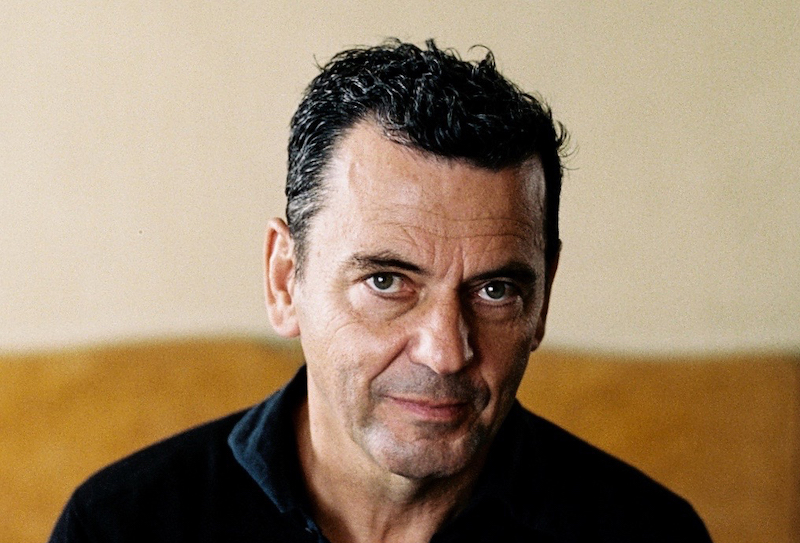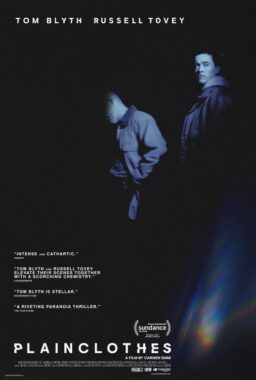Christian Petzold’s latest film “Transit” follows European refugee Georg (Franz Rogowski) as he flees soon-to-be-occupied Paris for the port city of Marseille with a dead leftist writer’s manuscript in tow. When he arrives in Marseille, he heads to the Mexican consulate to get a visa out of France, but the consul mistakes him for the writer in question. Georg assumes the writer’s identity and takes the papers and boat ticket that belonged to him. Though he plans to keep to himself until his departure date, he falls in love with the dead writer’s wife, Marie (Paul Beer), who’s still searching for her lost husband, throwing his identity and life into chaos.
Based on Anna Seghers’ book set during WWIII, “Transit” obviously evokes Nazi occupation, but Petzold doesn’t use any signifiers to suggest that the film is set in the ’40s. He purposefully sets a “period film” in modern times to create a liminal temporal space in which past and present effectively collapse. Yet, Petzold rarely if ever calls attention to this fact, engendering a sense of cognitive dissonance with relation to location and time. The melodramatic passion crossed with jumbled historicity underscores Petzold’s obvious, but no less worthwhile point: we haven’t come as far as we think we have. In fact, we might just be where we started.
Last November, RogerEbert.com sat down with Petzold to discuss “Transit,” his mentor Harun Farocki, Kafka, Robert Altman, Chantal Akerman, genre films, “Den of Thieves,” and more. “Transit” will be released on March 1 in New York and Los Angeles.

In an interview with Film Comment, you described “Transit” as the final film in a trilogy entitled “Love in the Times of Oppressive Systems.” I’m curious how those two concepts, love and oppression, connect in your mind.
For me, love is not the opposite to oppression. All the studio bosses in Hollywood think a good love can fight the oppression. I don’t think so. The oppression also is working into the love affairs and the love structures, and to fight against oppression you need more than love. But what happened to love in a different oppression, because the oppression in the German Democratic Republic is not the same oppression in the times of the Nazis or in the times of the refugees. But what is happening to love? Love is a production and it’s also a mirror of the things happening in the world. For me, love is freedom, but you have to work very hard, during oppression time, to realize love that is not oppression.
Why do you view your career as a series of trilogies? Is it easier for you to make films that way?
For me, cinema is something to do with society and cities, and not with lonely buildings like museums. When architects build museums—it’s fantastic architecture, with a park around it—it’s lonely. It’s just one. It’s an unikat. I think in the last years, because the cinema [movie theaters] is a little bit in a bad position, there are more festivals than cinemas nowadays, you have a typical festival movie and it’s like this museum. Each movie is by itself. It has no neighborhood anymore. It doesn’t have correspondence with film history and also contemporary movies. I have a big desire not to build unikats.
When I say to myself before Harun [Farocki’s] death, we talk both about this trilogy thing. When we start a trilogy, it’s not a series for TV. We don’t have to realize everything in one masterpiece. We make a street or three houses with a neighborhood. Then, for example, our friends Dominik Graf and Thomas Arslan [contemporary German directors who are a part of the Berlin School movement], also build three houses on the other side, and so perhaps we can find a city. A city of cinema.
Speaking of Harun Farocki, his voice has flowed through your work forever. Where is Farocki in “Transit”?
I must say that I only realized this years after his death: I was together with his widow at the premiere [of “Transit” in Berlin], and we both started crying because we realized the main character is him. Harun was half-Indian, he’s born in Czechoslovakia, his father was a Nazi or not a Nazi, nobody knows really. He was always around, he was always looking, he was always through the world, and he knows that you can find yourself by yourself. The main character in the book by Anna Seghers, he’s telling a story, he had lost everything, but he can talk about this loss, so he has an identity. I’ve seen Harun every time I’ve read this book.
How did you first come across the book?
Harun passed it to me because I made bad jokes about Anna Seghers. I hadn’t read a line of hers, but we were both together in a car on a way to a football match—he was a left defender and I’m a right offender on the same team, Tasmania Berlin is the name—and I make jokes about Anna Seghers because other people made jokes about Anna Seghers and I copied them. He stopped the car and asked me if I was crazy, and said she was one of the best German-language novelists ever. He passed me “Transit” and other books in the same weekend, and I must say he was right.
I feel like Seghers is a neat analogue for Weidel [the leftist writer who commits suicide in “Transit,” sparking the main plot], that type of resistance writer.
You know, that guy was a friend of hers.
Oh! I did not know that.
I forgot the name. Carl Einstein was the name of the author who killed himself in Paris.
TRANSLATOR: [Ernst] Toller?
No, no. Toller committed suicide in New York. Carl Einstein. He was not popular. Information during the time of the refugees…it’s not like today where you have a phone. If you’re thinking of someone who’s very important to you, you could hear half a year later that he’s been dead for a year. Your whole network, your whole trust in life, is totally interrupted and destroyed.

One of the reasons I love this movie is the experience of cognitive dissonance with relation to the way you eschew period signifiers. I’m curious how did you want to convey this liminal temporality, this collapse between past and present? You only really tip your hand with a “Dawn of the Dead” reference at one point, but other than that, it’s all in the background. What was the impulse to collapse those temporal frameworks?
It starts with a negative idea. It was five years ago in Palm Springs. I was there with my son. I had written this first draft of “Transit” as a period picture during our father-son voyage through California because we had seen “Boyhood” by Richard Linklater and my son loved it so much and we wanted to do it like a father-son story. In the evening when he was in bed, I would write in front of cheap motels. We stayed in motels since he’s always playing this “GTA” [“Grand Theft Auto”], and he wanted this atmosphere from “GTA.” I’m sitting there in front of the hotels because I’m a smoker. Then we were in the desert, in 29 Palms, and we decided to walk a little, but when we came back to the car, it was 90° inside the car. My MacBook was destroyed by the heat. I went to the Apple Store in Palm Springs and they said it was totally destroyed. They had to throw everything out. I had no backup. It was not part of the Cloud. It was gone. In this moment, I feel relieved because it was a wrong idea to make a period picture from our contemporary point of view to the past.
There were two movies that are very important to me. The first is Robert Altman’s “The Long Goodbye,” because it’s about a private detective from 1942, the same time Anna Seghers wrote “Transit,” but it’s contemporary. He has the car from 1942, the morality, the psychic structure of 1942, but he’s surrounded by mafia and gated communities. The other was a movie from Brussels. A Belgium movie by…because I’ve talked too much in English, my memory is gone. What’s her name? One of my favorite directors. I’ve forgotten her name.
Chantal Akerman?
Chantal Akerman! Thank you very much. “A Girl in Brussels, 1967,” I think is the title. [Note: The film was entitled “Portrait of a Young Girl at the End of the 1960s in Brussels.”] She made this movie nowadays but she’s telling a story from 1967. She was wearing some clothes from 1967, she’s buying a record by the Rolling Stones from 1967, but she’s surrounded by CDs and smartphones and so on. In this moment, this is not a joke. It’s like a Brecht setting, but it’s not art. There’s no joke, no art. It opens something. For example, this Chantal Akerman movie opens in 1967, there was a hedonistic revolution, a political revolution. Nowadays, she’s surrounded by shopping malls and the Apple advertisements. Everything from 1967 is changed into a commercial. Like the detective in 1942. His morality is used in Hollywood, but Hollywood is in the hand of economic mafia structures. This is the idea. It opens a third space. In this moment, I have this idea to say you can tell this story in nowadays, but when you’re in Marseilles, you see houses the Germans had destroyed because they housed resistance fighters. Then they built neoliberal new houses, and they have the old house, and then the houses the Germans built. You have all these times in the same moment. Why can’t a movie be like a city? This was the idea.
Beyond the filmic influences, I’m curious about other literary influences. I saw “Transit” and immediately thought of Kafka. The main character in “Transit,” Georg, shares a name with the protagonist in Kafka’s short story “The Judgment” as well as Kafka’s cousin who was killed in the Holocaust. Marseille in the film feels like a classic Kafka setting: a purgatorial, bureaucratic nightmare. Was he on your mind at all?
When you read “Transit” by Anna Seghers, she’s using Kafka. Everybody who has used the word “Kafka” for “Transit,” it’s a trace Anna Seghers made by herself. This little story that George is telling the American consulate it’s a story out of a Kafka story. She uses Kafka because as she’s sitting there in Marseille, the German literature surrounds her and the Jewish literature is totally destroyed. So, you have to take some of the literature with you. You never will forget it. It’s a Kafkaesque situation. But in Kafka, there is no sun or wind. But there, you’re surrounded by a fantastic Mediterranean sea, the blue sky, the fantastic food and coffee and pizza and Rosé, but it’s also Kafka.
That open space also has a claustrophobia.
TRANSLATOR: Agoraphobia!
[Petzold laughs]

You frequently work within melodrama. How do you view that genre in a contemporary context? How do you see its vitality in the 21st century?
At the end of 70s, at the beginning of the 80s, when I started going to cinemas, you have two directions in Germany: the Wim Wenders direction and the Fassbinder direction. For me, as someone who loved American cinema, I was on the Wim Wenders side. It changed some years later. Harun Farocki, his magazine “Filmkritik,” they never talked about Fassbinder. Never. I am really sure it had something to do with his homosexuality because these are men who make the film magazine. They are haters of sexual men. They like police movies and westerns. So they don’t want to talk about the music of George Clinton and the movies by Fassbinder. The melodramatic has always something to do with homosexuality. I don’t know why, perhaps it’s a little strange to say it like this, but, I think, I’ll try it in English: melodramas are filled up with empathy and also they’re very, very sad. They’re telling their stories from a position of empathy and distance at the same moment.
TRANSLATOR: Artifice, too. The artifice in the feeling.
<span class="s1" <the="" artificial!="" the="" clothes.="" gestures.="" i="" saw="" The artificial! The clothes. The gestures. I saw “Suspiria” five days ago.
How did you like it?
I like it! I like it! Many people don’t like it, but for me, the dancing scenes are really great.
I’m totally heterosexual, I must say. But I’m really sure this position [of being homosexual], you’re a little bit on the outside of society. You have to find your own stages. Through Fassbinder, I saw the movies of Douglas Sirk for the first time in my life, and I thought it was some great cinema. The heterosexuality of Billy Wilder and Edgar Ulmer, they came from the same group. Douglas Sirk and Billy Wilder have made movies together. The melodramas and the crime stories and the hard western stories of the genre movie, they are together for me. This is real cinema.
Your films explore this idea of doubling and fractured identities, two people playing the same person or one person being mistaken for the other. Why do you keep returning to this subject?
One issue of Harun Farocki’s magazine “Filmkritik” was about men who wanted to change their identity. For example, after the big tsunami, there are many people who disappeared. They never find their bodies. Many tourists there have the idea, “They think I’m dead. I have the chance at a new identity.” Harun researched these biographies, about people who said to their wives, “I’m going out to buy cigarettes” and they never come. What they mostly have done is that they built the same identity in another part of the world. Two children, one wife, etc. This desire to change your life—you’re on a wrong road, you can choose a detour—is in the people, but every time they rebuild the same identity. But in cinema, they have the chance to build another identity. The fight against the patterns is storytelling in cinema.
I saw you published your 10 favorite films of the last 10 years on Grasshopper Film. What has gotten some attention on the Internet is that you picked Christian Gudegast’s “Den of Thieves” as one of your 10.
I love this movie!
I have not seen it. I’m curious what you like about it.
Like I said, there are more festivals than cinemas in the world, so you have the typical festival film, and the typical festival film is a movie with a subject: two lesbian Jewish girls or something, or there’s a leaf tree between Gaza and Jerusalem. So [in contrast], I love three guys who want to rob a bank. There is desire, they want to be rich, but they also have skills. They’re from the working class. They phone each other, “You can work with a lock opener? You’re a good driver?” They make a group. This has something to do with making movies. Not to find a subject in Gaza. You have to find a group, which can work together.
TRANSLATOR: A team.
A team! Team building is one of the best things to tell stories about, about loyalty and love.
I was together with my son and we were eating hamburgers and he said, “Let’s go to cinema.” I love to go to ordinary cinemas where there is no white wine in the lobby and such. We sat there and watched the movie. The German title was “Criminal Squad.” From the beginning, I was totally impressed. I was more impressed with it than Michael Mann’s “Heat” because there are no method actors in this movie. There is no Al Pacino and no Robert De Niro. There are faces and bodies and tattoos, which has something to do with a working class that is lost. I was totally impressed by the movie.
This interview has been edited and condensed for clarity.












